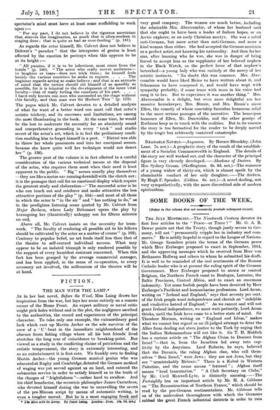FICTION.
THE MAN WITH THE LAMP.*
As in her last novel, Before the Wind, Miss Laing draws her inspiration from the war, but lays her scene entirely on a remote corner of the Home Front. An expert military or naval critic might pick holes without end in the plot, the negligence ascribed to the authorities, the record and experiences of the principal character. To take only one example, the extraordinary good luck which cast up Martin Ascher as the sole survivor of the crew of a ' '-boat in the immediate neighbourhood of the obscure Scots fishing village where all his best friends: lived stretches the long arm of coincidence to breaking-point. But viewed as a study in the conflicting claims of patriotism and the artistic temperament, the story is extremely interesting, and as an entertainment it is first-rate. We frankly own to finding Martin Ascher—the young German musical genius who was educated at Rugby and Cambridge, detested the German method of waging war yet served against us on land, and entered the submarine service in order to satisfy himself as to the truth of the charges of "frightfulness "—rather hard to swallow. And his chief benefactor, the eccentric philosopher James Carruthers, who devoted himself during the war to unravelling the secret of the pre-Minoan script by means of automatic writing, is even a tougher morsel. But he is a most engaging freak and very good company. The women are much better, including the admirable Mrs. Abercrombie, of whom her husband said that she ought to have, been a leader of forlorn hopes, or an Arctic explorer, or an early Christian martyr. She was a rabid anti-German, but more artist than anti-German, and more a kind woman than either. She had accepted the German musician as a perfect artist, not knowing his nationality. And then for her sins, after learning who he was, she was in danger of being forced to accept him as the supplanter of her beloved nephew in the Black Watch, as the perfect lover of that nephew's betrothed—a young lady who was entirely at the mercy of her artistic instincts. "No doubt this was romance. Mrs. Abercrombie would have liked Heine to have written about it, and Schumann to have composed it, and would have wept with sympathy probably, if some tenor with tears in his voice had sung it to her. But to experience it was another thing." Mrs. Abercrombie is a delight, but even more delightful are her massive housekeeper, Mrs. Millie, and Mrs. Binnie's niece Ellen, the comedy of whose courtship furnishes humorous relief to the more serious passages of the narrative. The homespun humours of Ellen, Mr. Dunwiddie, and the other gossips of Rathness keep us in touch with the realities. But in its essence the story is too fantastical for the reader to be deeply moved by the tragic but arbitrarily contrived catastrophe.
READABLE NOVELS.—Anymoon. By Horace Bleackley. (John Lane. 7s. net.)—A prophetic story of the result of the establishment of a Socialist Commonwealth in England. The details of the story are well worked out, and the character of the principal figure is very cleverly developed.—Shadows of Desires. By Mrs. Sydney Groom. (Skeffingtons. 6s. 9d. net.)—The romance of a young widow of thirty-six, which is almost spoilt by the abominable conduct of her only daughter.—The Seekers. By Hugh F. Spender. (Collins. 6s. net.)—A novel dealing, not very sympathetically, with the more discredited side of modern spiritualism.














































 Previous page
Previous page